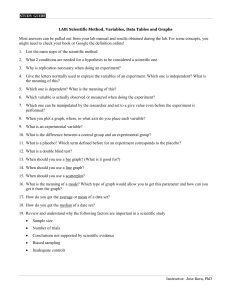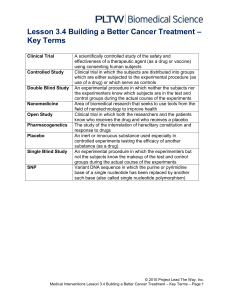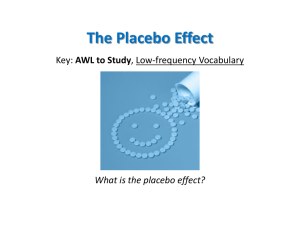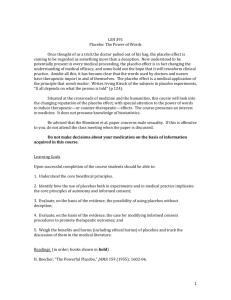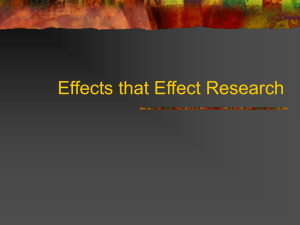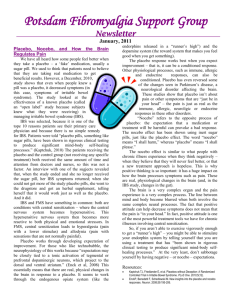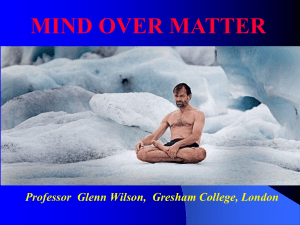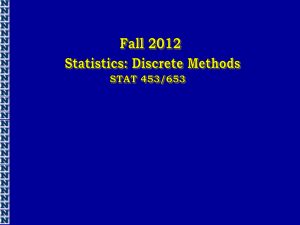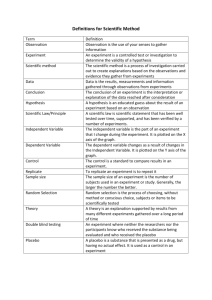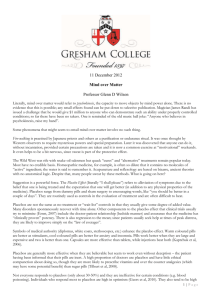LSH 389: Placebo: The Power of Words
advertisement
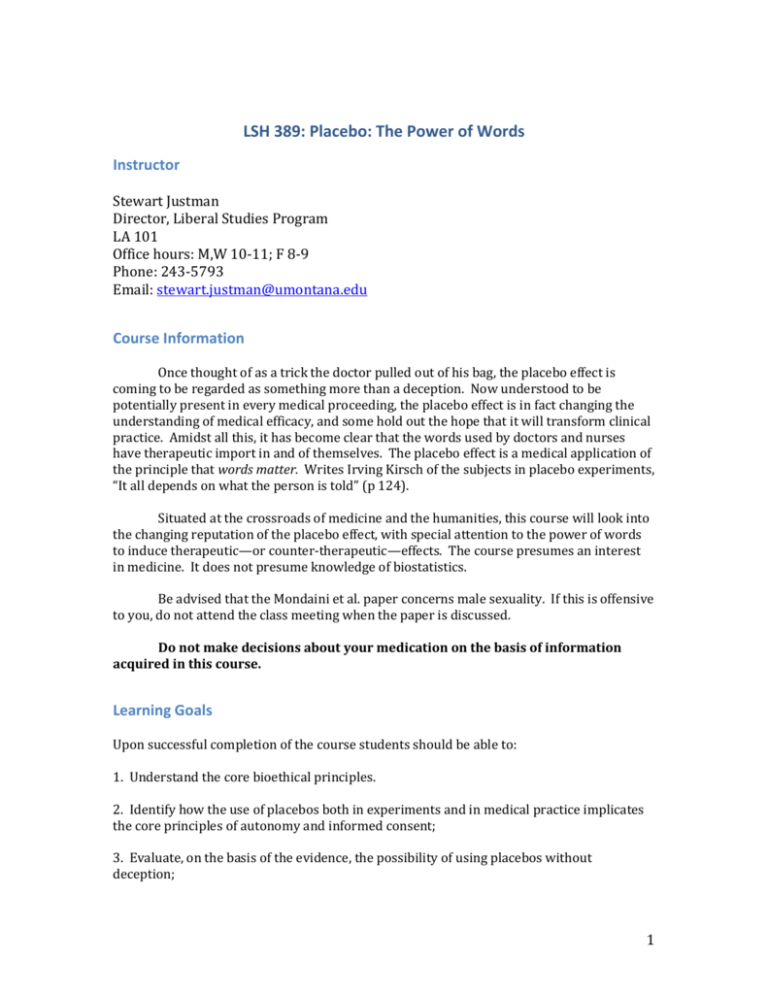
LSH 389: Placebo: The Power of Words Instructor Stewart Justman Director, Liberal Studies Program LA 101 Office hours: M,W 10-11; F 8-9 Phone: 243-5793 Email: stewart.justman@umontana.edu Course Information Once thought of as a trick the doctor pulled out of his bag, the placebo effect is coming to be regarded as something more than a deception. Now understood to be potentially present in every medical proceeding, the placebo effect is in fact changing the understanding of medical efficacy, and some hold out the hope that it will transform clinical practice. Amidst all this, it has become clear that the words used by doctors and nurses have therapeutic import in and of themselves. The placebo effect is a medical application of the principle that words matter. Writes Irving Kirsch of the subjects in placebo experiments, “It all depends on what the person is told” (p 124). Situated at the crossroads of medicine and the humanities, this course will look into the changing reputation of the placebo effect, with special attention to the power of words to induce therapeutic—or counter-therapeutic—effects. The course presumes an interest in medicine. It does not presume knowledge of biostatistics. Be advised that the Mondaini et al. paper concerns male sexuality. If this is offensive to you, do not attend the class meeting when the paper is discussed. Do not make decisions about your medication on the basis of information acquired in this course. Learning Goals Upon successful completion of the course students should be able to: 1. Understand the core bioethical principles. 2. Identify how the use of placebos both in experiments and in medical practice implicates the core principles of autonomy and informed consent; 3. Evaluate, on the basis of the evidence, the possibility of using placebos without deception; 1 4. Evaluate, on the basis of the evidence, the case for modifying informed consent procedures to promote therapeutic outcomes; and 5. Weigh the benefits and harms (including ethical harms) of placebos and track the discussion of them in the medical literature. Readings (in order) Books are shown in bold. H. Beecher, “The Powerful Placebo,” JAMA 159 (1955): 1602-06.** A. Branthwaite and P. Cooper, “Analgesic Effects of Branding in Treatment of Headaches,” British Medical Journal 282 (1981): 1576-78.** K. B. Thomas, “General Practice Consultations: Is There Any Point in Being Positive?”, British Medical Journal 294 (1987): 1200-02.** F. Benedetti, “How the Doctor’s Words Affect the Patient’s Brain,” Evaluation and the Health Professions 25 (2002): 369-86.** F. Benedetti et al., “When Words are Painful: Unraveling the Mechanisms of the Nocebo Effect,” Neuroscience 147 (2007): 260-71.** W. Haüser et al., “Nocebo Phenomena in Medicine,” Deutsches Ärzteblatt International 109 (2012): 459-65.** R. Hahn, “The Nocebo Phenomenon: Concept, Evidence, and Implications for Public Health,” Preventive Medicine 26 (1997): 607-11.§§ R. Ferrari, “The Biopsychosocial Model—a Tool for Rheumatologists,” Best Practice and Research. Clinical Rheumatology 14 (2000): 787-95.** A. Shapiro and E. Shapiro, The Powerful Placebo: From Ancient Priest to Modern Physician (Johns Hopkins UP, 1997), chs. 1, 4, 5, 11. F. Benedetti, Placebo Effects: Understanding the Mechanisms in Health and Disease (Oxford UP, 2009), chs. 2, 3, 5, 10. I. Kirsch, The Emperor’s New Drugs: Exploding the Antidepressant Myth (Basic, 2011), chs. 1, 2, 5, 6. E. Loftus and J. Fries, “Informed Consent: Right or Rite?”, CA—A Journal for Clinicians 29 (1979): 316-18.** 2 F. Miller and L. Colloca, “The Placebo Phenomenon and Medical Ethics: Rethinking the Relationship between Informed Consent and Risk-Benefit Assessment,” Theoretical Medicine and Bioethics 32 (2011): 229-43.** N. Mondaini et al., “Finasteride 5 mg and Sexual Side Effects: How Many of These are Related to a Nocebo Phenomenon?”, Journal of Sexual Medicine 4 (2007): 1708-12.** L. Vase et al., “The Contributions of Suggestion, Desire and Expectation to Placebo Effects in Irritable Bowel Syndrome Patients: An Empirical Investigation,” Pain 105 (2003): 17-25.†† A Sandler, “Placebo Effects in Developmental Disabilities: Implications for Research and Practice,” Mental Retardation and Developmental Disabilities Research Reviews 11 (2005): 164-70.** A. Sandler and J. Bodfish, “Open-Label Use of Placebos in the Treatment of ADHD: A Pilot Study,” Child: Care, Health and Development 34 (2008): 104-10.§§ T. Kaptchuk et al., “Placebos without Deception: A Randomized Controlled Trial in Irritable Bowel Syndrome,” PLoS One 5 (2010): e15591.** S. Justman, “Deceit and Transparency in Placebo Research,” Yale Journal of Biology and Medicine 86 (2013): 323-31.** J. Howick et al., “Placebo Use in the United Kingdom: Results from a National Survey of Primary Care Practitioners,” PLoS One 8 (2013): e58247.** ** = available on Google Scholar §§= available in Mansfield Library Journal collection Assignments Paper 1: Citing readings, contrast the view of the placebo effect as (a) nuisance, sham or confounder and (b) source of therapeutic benefit in a double-spaced paper of 1250 words or more. Due October 9. Paper 2: (a) In a double-spaced paper of 1250 words or more, discuss ethical issues attached to the exploitation of the placebo effect and/or possible sacrifices of efficacy entailed by the ethical exploitation of the placebo effect. Due December 9. OR (b) In a paper of 1250 words or more, review the coverage of one of the syllabus papers in three papers in the medical literature, bringing out what the papers emphasized and what they may have missed. Due December 9. 3 Final Exam An essay exam; take-home. Grading The two papers and the final exam will weigh equally, each accounting for one third of your final grade. Attendance Three missed classes are allowed, after which absences are liable to penalty. Disability If you think you have a disability impairing your academic performance and you have not already registered with Disability Services, contact Disability Services in Lommasson Center 154 or call 243-2243. For Further Reading David Healy, Pharmageddon, University of California Press, 2013. Stewart Justman, The Nocebo Effect: Overdiagnosis and Its Costs, Palgrave Macmillan, 2015. Joanna Moncrieff, The Myth of the Chemical Cure: A Critique of Psychiatry Drug Treatment, Palgrave Macmillan, 2009. David Newman, Hippocrates’ Shadow, Scribner, 2009. Robert Whitaker and Lisa Cosgrove, Psychiatry Under the Influence: Institutional Corruption, Social Injury and Prescriptions for Reform, Palgrave Macmillan, 2015. 4
